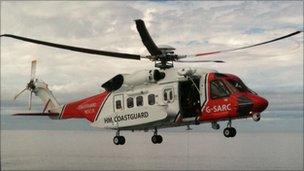Plans to close three Scottish coastguard stations
- Published

Cutting the number of control centres is intended to modernise the service and save money
Scotland will be left with one 24-hour coastguard co-ordination centre under plans unveiled by the UK government.
Ministers propose leaving one main control centre at Aberdeen, with a second station operating in daylight hours at either Shetland or Stornoway.
The centres at Clyde and Forth look set to close under the plans.
The UK's 18 coastguard stations are to be reduced to eight, with only three operational around the clock.
Cutting the number of control centres is intended to modernise the service and save money.
The government has postponed an announcement about the sell-off of the UK's search and rescue helicopters.
'Congested' seas
Shipping Minister Mike Penning said the organisation of the coastguard dated back 40 years and "cannot stand still".
He said the Aberdeen centre would be "capable of managing maritime incidents wherever and whenever they occur and with improved information systems".
"Our seas are becoming busier, with larger ships and increasing numbers of offshore renewable energy platforms making key areas of our seas more congested," he added.
Currently, all of the UK's maritime rescue co-ordination centres all provide a 24-hour service.
The plans have attracted criticism from Scottish MPs.
Labour's Shadow Scotland Office Minister Tom Greatrex criticised the plans, saying the cuts could have "serious implications for public safety".
Angus MacNeil, MP for the Western Isles, also voiced anger at the decision to close either Stornoway or Shetland.
He said there was too much coastline around the islands for one centre to cope at night.
"These Tory cuts put saving money ahead of saving lives, and are a totally irresponsible step," he said.
Mr MacNeil pointed out that a coastguard tug would also be removed from Shetland and said the proposals had "all the hallmarks of a decision about money and nothing to do with safety".
'Downright dangerous'
David Cairns, whose Greenock and Inverclyde constituency covers the Clyde base, said the plans were an "absolute disgrace".
He said: "I do accept that there is a scope of modernisation within the coastguard, and I have no fear that should Forth and Clyde bases be measured and evaluated against the rest of the bases, their case would be strong.
"That's why it is utterly appalling that they have been cast aside before the consultation begins.
"The Clyde base looks after an exceptionally busy shipping lane, with cruise liners, submarines and naval fleets all passing through the waters. The impact on Scotland of these changes is hugely significant and downright dangerous."
Scottish Liberal Democrat leader Tavish Scott, MSP for Shetland, said coastguard stations in both Lerwick and Stornoway were needed.
He explained: "The local knowledge of their area built up and held by the teams in both stations is invaluable and keeps safe those who travel and earn their living on and around our seas.
"Officers in a single station could not possibly keep and develop the same degree of this vital local knowledge."
Across the UK, the 24-hour operational centres will be in Aberdeen, Dover and in the Southampton/Portsmouth area.
Five sub-centres open only during daylight hours will be in Swansea, Falmouth in Cornwall, Humber, either Belfast or Liverpool, and either Stornoway or Shetland.
A small centre on the Thames in London will remain unaffected by the changes.
A 14-week consultation on the proposals has begun.
- Published16 December 2010
- Published16 December 2010